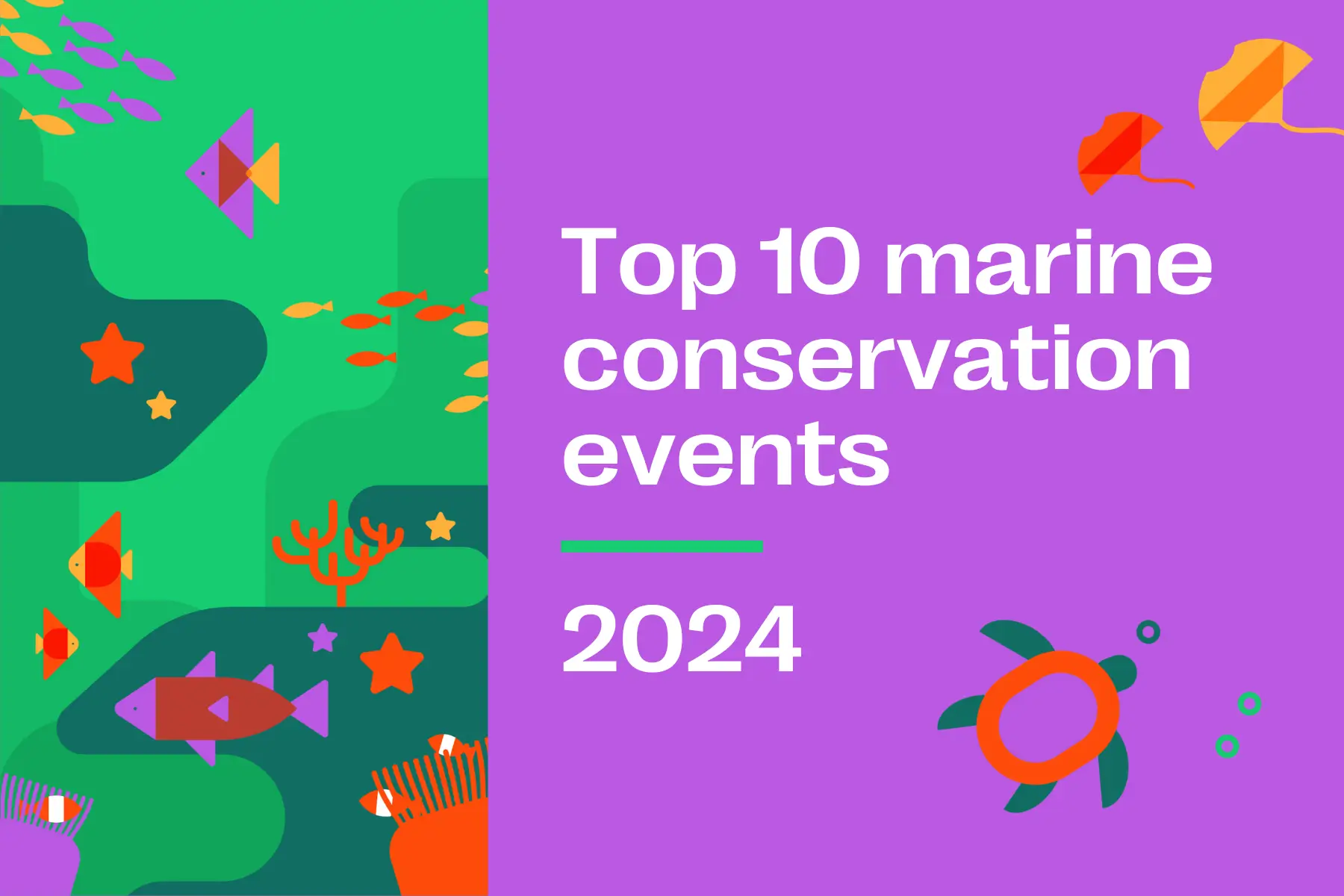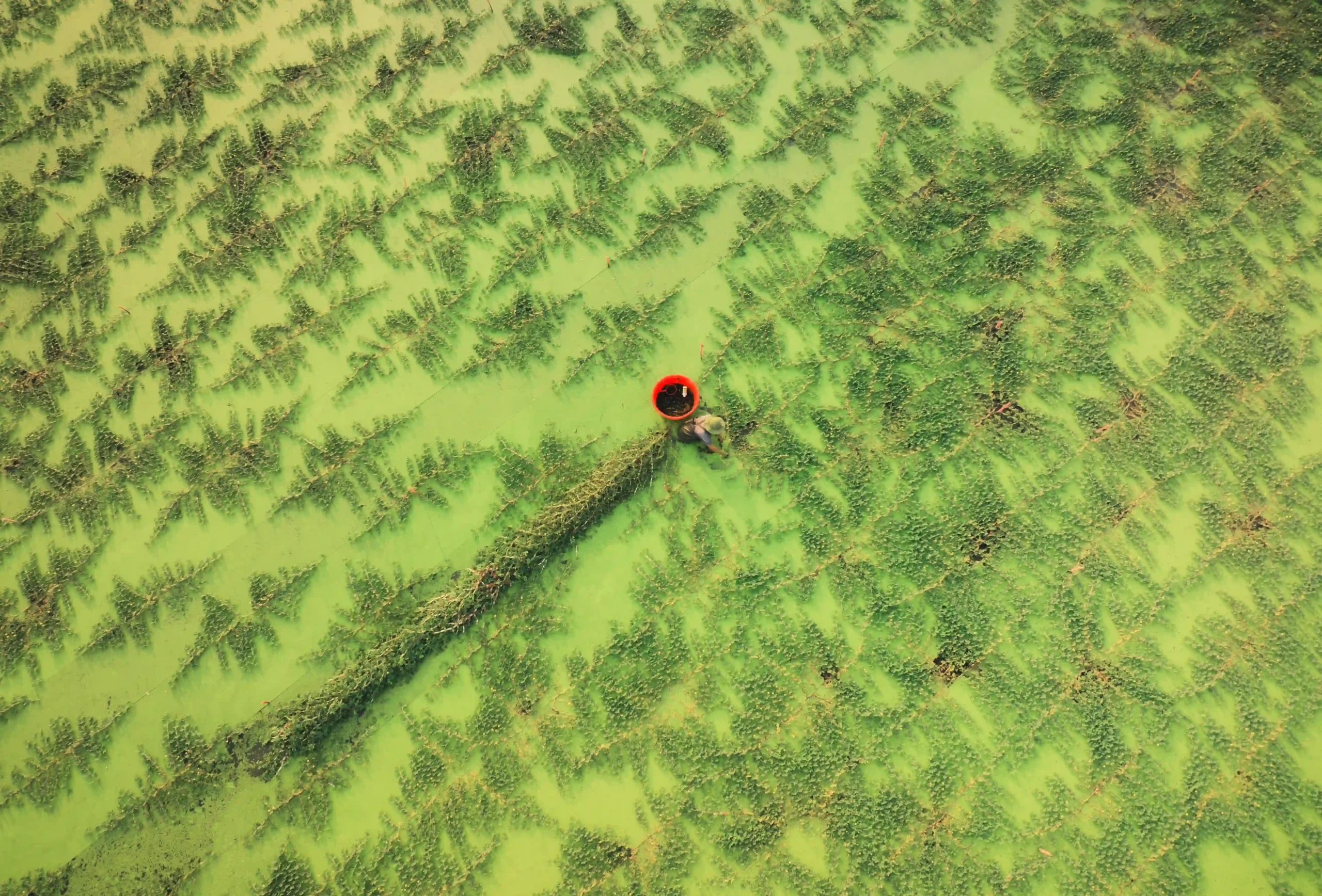Top 10 marine conservation events in 2024
Bethan Thomas

The ocean sustains all life on our planet. It is the primary regulator of our climate, provides food and livelihoods to billions of people, and supplies over half the oxygen we breathe.
Yet, in spite of our reliance on a healthy and abundant ocean, it currently faces numerous threats, from rising sea temperatures, acidification and pollution, to overfishing, drilling and bottom-trawling. Fortunately, there are many game-changing organisations and campaigners leading the way in protecting our blue spaces and uniting the global marine community to drive positive change.
Over the last few years, thanks to their efforts, we have seen ocean action rise up the political agenda and take a more prominent role within climate negotiations. Just last month, COP28 ended with an unprecedented acknowledgement of the role the ocean plays in stabilising our climate, with the final version of the global stocktake report calling on world leaders to “preserve and restore oceans and coastal ecosystems”.

Of course there is still more to do, and conferences are a vital way to foster the international collaboration required to scale and accelerate ocean conservation efforts. There are lots of dedicated events focused on marine biodiversity taking place this year which share the same goal: to ensure a healthy, thriving, biodiverse ocean for generations to come.
Here’s a list of the top 10 events making waves for our blue spaces...
1. Coastal Futures
When? 24th-25th January
Where? London, UK
Who for? Coastal and marine professionals and practitioners
The Coastal Futures conference brings together over 750 delegates from 200 organisations to discuss and debate the issues facing the UK’s coastline and the best ways of addressing these within legislation and policy frameworks. It is also a chance for ocean stakeholders to collaborate and network to bring about positive action for our coasts and seas.
To find out more, click here.
2. Ocean Sciences Meeting
When? 18th-23rd February
Where? New Orleans, US
Who for? Scientists, students, journalists, policymakers, educators and marine organisations
Held every two years, the Ocean Sciences Meeting unites the international science community in the quest to ensure a sustainable future for our ocean. The conference offers the opportunity for a diverse marine community to share their findings to advance the impact of ocean science. The meeting is endorsed by the United Nations Decade of Ocean Science for Sustainable Development (2021-2030), a global initiative dedicated to furthering ocean science in order to reverse the decline of our ocean’s health and encourage sustainable development of its resources.
To find out more, click here.
3. World Ocean Summit
When? 11th-13th March
Where? Lisbon, Portugal
Who for? Marine experts, business and finance, government, national and international policymakers, civil society and academia
The theme of this year’s World Ocean Summit is finding real-world solutions to global ocean challenges. The agenda will focus on ocean health, industry strategies for a sustainable ocean economy, and ocean-climate solutions. The Summit brings together everyone within the ocean community - from businesses and civil society to academics and policy makers - to inspire partnerships, solutions and strategies to meet the targets of UN Sustainable Development Goal 14.
SDG 14 - Life Below Water - focuses on the conservation of our ocean and the sustainable use and development of marine resources.
To find out more, click here.

4. Ocean Decade Conference
When? 10th-12th April
Where? Barcelona, Spain
Who for? The Ocean Decade community and partners
Three years after the UN Decade of Ocean Science for Sustainable Development began, the Ocean Decade Conference brings together the global ocean community to celebrate the achievements made so far and set out the priorities for the rest of this decisive decade. This conference will create a new foundation to strengthen sustainable ocean management and drive science-based innovation so that our ocean can flourish in the decades to come.
To find out more, click here.
5. Reef Resilience Symposium
When? 16th-18th April
Where? Cairns, Australia
Who for? Marine practitioners, managers, researchers, engineers, Traditional Owners and industry leaders
Coral reefs are a biodiverse marine ecosystem, providing coastal communities with a source of food and income whilst protecting our coastlines and enriching our seas. Yet, with ocean temperatures heating up, coral reefs are struggling to cope with the rate of environmental change. The Reef Resilience Symposium brings together those working to support the resilience of these vital marine ecosystems and support the coastal communities that depend upon them.
To find out more, click here.
6. UNOC Stakeholder Meeting
When? 7th-8th June
Where? San Jose, Costa Rica
Who for? Government officials, civil society organisations, non-governmental organisations and private sector entities,
Looking towards the third UN Ocean Conference, which will be held in France in 2025, this stakeholder meeting will serve as a platform to exchange best practices and success stories for ocean governance and health. Eight international panels will convene to address the environmental crises affecting our ocean globally, from tackling plastic pollution to the use of satellite technology in ocean conservation.
To find out more, click here.
7. International Seagrass Biology Workshop
When? 17th-21st June
Where? Napoli, Italy
Who for? Students, researchers, non-academics and the wider seagrass community
Seagrass ecosystems are the hidden hero in tackling both the climate and biodiversity crises we face. These marine habitats found in the shallow, sheltered areas of our coastlines absorb carbon, provide a habitat for marine biodiversity and protect our shorelines from erosion. The 15th International Seagrass Biology Workshop will address the global challenges facing seagrass ecosystems, taking a deep dive into this year’s theme: Seagrasses in the Anthropocene. The conference will assess the accelerating pressures humans are placing on seagrass ecosystems and how to secure a sustainable future for this vital plant.
To find out more, click here.

8. European Coral Reef Symposium
When? 2nd-5th July
Where? Naples, Italy
Who for? Coral reef scientists, researchers, conservationists, Indigenous Peoples, policymakers and reef managers
The European Coral Reef Symposium is held every four years to further the aims of the International Coral Reef Society within Europe. This year’s theme is focusing on bridging knowledge gaps between tropical, temperate and cold-water coral reefs, taking a look at the latest research to advise international and national policies in the conservation and sustainable use of coral reefs.
To find out more, click here.
9. International Conference on Oceanography and Marine Biology
When? 9th-10th September
Where? Barcelona, Spain
Who for? Researchers, students, industrialists, speakers, delegates
This two-day conference focuses on the current research within the fields of oceanography and marine biology. The conference covers a diverse range of topics, from marine biodiversity to chemical oceanography. It aims to provide a detailed study of current developments within oceanography and marine biology whilst providing a platform for marine science and knowledge exchange.
To find out more, click here.
10. UN Biodiversity Conference (CBD COP16)
When? 21st October – 1st November
Where? Colombia, South America
Who for? Parties to the UN Convention on Biological Diversity and relevant stakeholders including Indigenous Peoples and local communities, youth, women, NGOs, sub-national actors, and the business community.
A year on from the 15th Convention on Biological Diversity (CBD COP15) where world leaders agreed to the historic Global Biodiversity Framework to protect 30% of lands, oceans, coastal areas and inland waters by 2030, the 16th meeting will review the Parties’ alignment of their National Biodiversity Strategies and Action Plans. COP16 will also advance work to develop monitoring processes and resource mobilisation, to further the achievement of the aims of the Framework, with the protection of marine biodiversity being a key area of development.
To find out more, click here.
Bonus: UN Climate Change Conference
When? 11th-22nd November
Where? Abseron, Azerbaijan
Who for? Parties to UN Framework Convention on Climate Change, intergovernmental organisations, NGOs and relevant stakeholders.
Whilst not covering just the issues facing our oceans, the UN Climate Change Conference (COP29) brings together world leaders and stakeholders to measure progress and negotiate multilateral responses to climate change. COP creates global milestones for the climate movement whilst accelerating action and setting globally recognised standards for climate progress. The role the ocean plays in regulating our climate is beginning to gain attention and all eyes will be on this year’s COP to support ocean conservation as a critical solution to the climate crisis.
To find out more, click here.

Protecting and restoring our marine ecosystems requires global collaboration. Bringing together coastal communities and those with a passion for marine conservation helps to accelerate positive change and promotes scalable solutions to the challenges affecting our ocean.
The marine conservation events taking place this year will also set the stage for the forthcoming UN Ocean Conference, due to take place in Nice in June 2025, which is expected to bring about a new chapter for ocean conservation driven by science and innovation.
Connect with us on socials here to let us know if you’re planning on attending any of these events and keep up to date with our work to amplify the role of the ocean in climate action.


